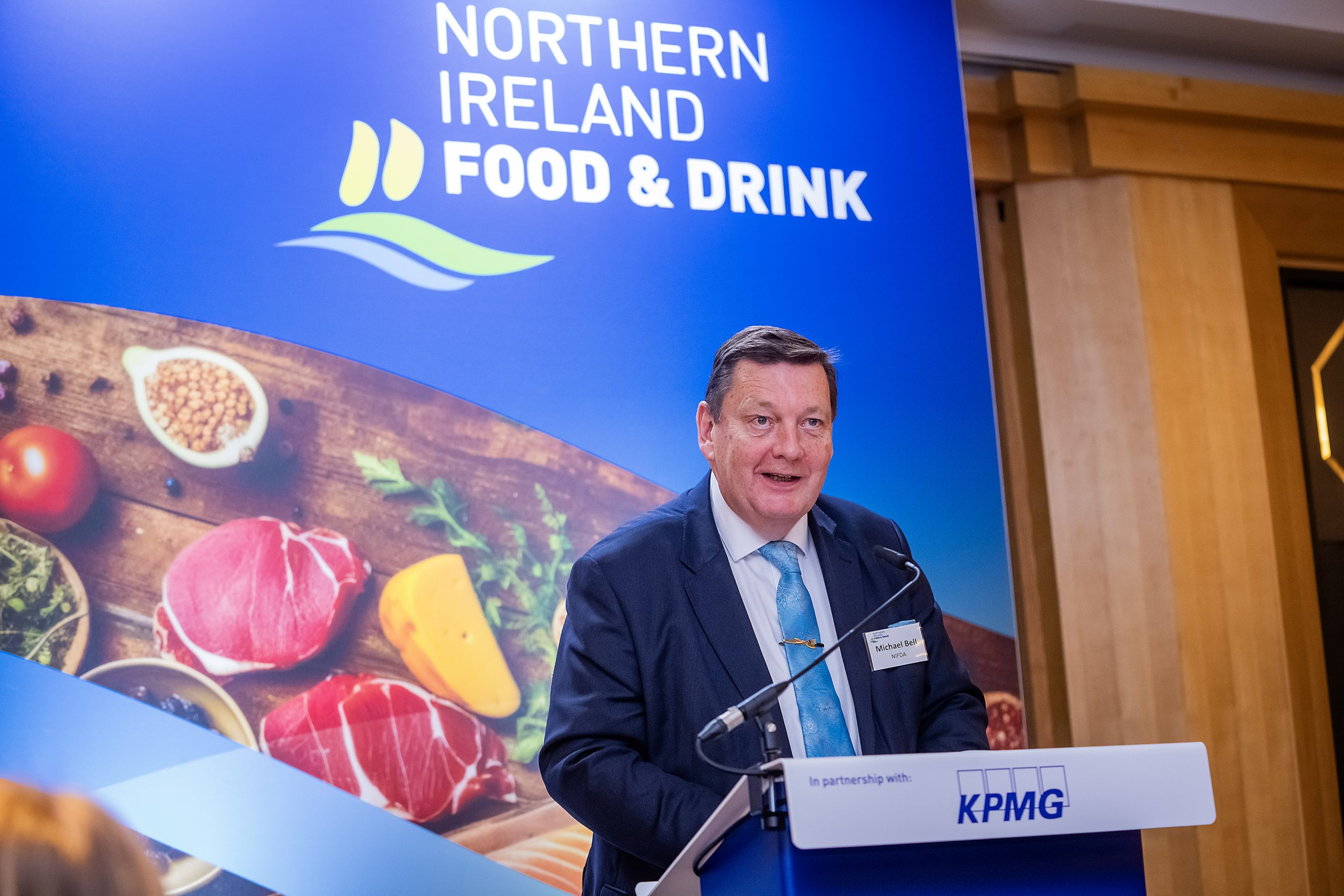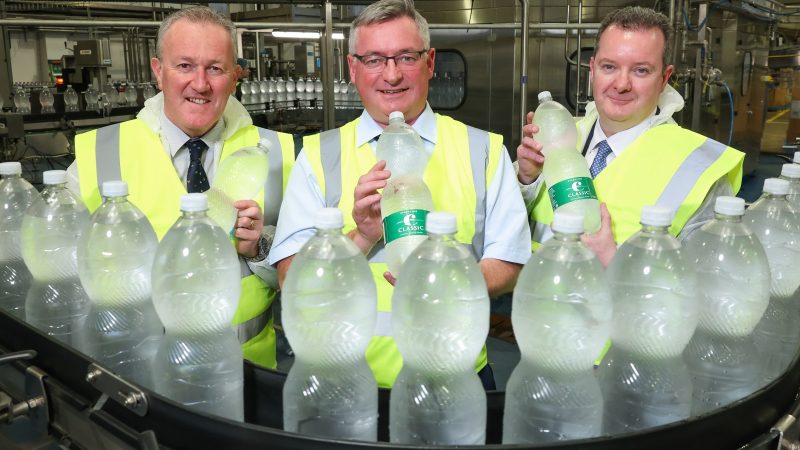NIFDA: Driving success through a challenging environment

Food and drink are the jewel in the crown of Northern Ireland’s economy. We are the largest single manufacturing industry here, and a key driver of economic growth, as Michael Bell OBE, Executive Director, Northern Ireland Food and Drink Association (NIFDA) explains.
Our NIFDA members are world renowned for quality, innovation, and commercial success – and we have the awards to prove it.
Together with what I call the wider ‘eating ecosystem’ – farming, transport, cold stores, packaging, retail – we are a £4.9 billion industry, supporting 113,000 jobs. We feed 10 million people. For a region of our size, that is impressive. We punch well above our weight.
Over the past year, Northern Ireland food and drink companies have continued to grow and drive that success through what has been a challenging environment. Inflation, hyperinflation even, continued to be an issue throughout 2023. Prices of feed, fertiliser and energy remained high, driving the price of food at a rate that had not been seen for multiple generations.
Sadly, while we are now seeing prices in some commodities begin to retreat, many of the factors driving inflation have not yet abated. The supply chain is still shouldering the bulk of this increased cost, but inflation is not going away any time soon.
FOOD INFLATION
In June the Groceries Code Adjudicator, Mark White, released the results of the GCA Groceries Sector Survey. Now in its 10th year, the survey gives suppliers the opportunity to share confidentially their experiences of negotiation over the past year. The survey unsurprisingly named inflation as a challenge, with over 90% of suppliers who responded to the survey requesting at least one cost price increase in the previous 12 months, but 28% of respondents reported either a refusal to consider a cost price increase from a retailer, or an unreasonable delay in reaching a decision on a request.
However, despite difficulties around inflation, the survey shows that suppliers think retailers have improved in their compliance to the Code and the average compliance score across the retailers was 92%.
Food inflation has been higher than at any point over the past decade, affecting businesses and consumers everywhere. Food and drink manufacturers have been doing their best to absorb these increased costs, but inevitably some price increases must be passed on, and industry continues to engage with retailers to ensure inflation is reasonably managed across the supply chain.

SUSTAINABILITY
The biggest long-term challenge we face as an industry, and as a society, is of course sustainability. Northern Ireland has set ambitious targets to lower our greenhouse gas emissions, and NIFDA members want to play their part in our collective journey to net zero. Food and drink companies in Northern Ireland are already implementing bold strategies to help move the sector towards that goal, both on farm and the factory floor.
Much of this work was highlighted in our ‘Balancing Act’ Sustainability Report, produced by KPMG Ireland earlier this year. As well as providing case studies of sustainability projects from local food and drink companies, the report focuses on the results of a sector-wide survey of NIFDA members on these issues and highlights the progress that still needs to be made.
The report highlights gains that have been made to date and demonstrates how NIFDA members are taking action, with 83% of firms having dedicated teams in place to lead on sustainability. Case studies show initiatives food and drink manufacturers are taking – from scaling up resourcing and expertise, investing in renewable energy and setting science-based targets, to innovations in food labelling, sustainable intensification and nature protection.
INVESTMENT NEEDED
However significant challenges remain, if we are to achieve the emissions reductions goals as set out in the NI Climate Act. Key obstacles to progress outlined in the report are the lack of capital investment support, and the overall political vacuum. 86% of NIFDA members surveyed do not think there is sufficient funding support to deliver on sustainability, while 77% believe clear policy direction would strengthen the industry’s response to environmental challenges.
Hopefully the new year will bring with it a restored Northern Ireland Executive, and a political will to deliver both growth and sustainability for our industry. Key to unleashing this potential is a capital investment support scheme.
Many of the projects with the highest potential to improve productivity and sustainability require investment, yet Northern Ireland remains the only jurisdiction on these islands without such a capex scheme in place. In June the Irish Government announced a €32 million investment in the agri-food sector to ensure the delivery of 12 important capital projects in food processing plants across the Republic of Ireland.
‘The biggest long-term challenge we face as an industry, and as a society, is of course sustainability’
Since 2020, food manufacturers south of the border have benefitted from €100 million in funding from the Capital Investment Scheme for the Processing and Marketing of Agriculture Products. Under the scheme, 34 projects have been backed, unlocking a total of €420 million in public and private investment.
Industry has engaged with cabinet ministers to highlight the pressing need for a similar investment programme for Northern Ireland, but from our meetings with the Chancellor and Secretary of State, the UK Government sees this as a devolved issue. Without ministers in place, any progress on such a targeted investment programme on this side of the border has been stalled.
We want to work with the Department of the Economy to help deliver its 10x strategy, but to embrace the benefits of advanced manufacturing, new technologies and innovation, we need support. Targeted investment in food and drink processing is vital if we are to enhance sustainability, encourage further innovation, make efficiencies to limit the impact of inflation, and modernise the industry so it continues to be seen as an employer of choice by the young people who will be future leaders.

LOOKING AHEAD
Looking ahead to 2024, there is lots to look forward to. On 6th February, supported by NIFDA and Invest NI, the UK Food and Drink Export Council (FDEC) will be hosting its first Northern Ireland event, aimed at NI food and drink businesses who want to boost their export capacity and reach. The FDEC is an important forum for industry, and gives us the opportunity to collaborate with government and industry partners from across the UK to learn from each other’s successes and share expertise.
The biggest event on the food and drink calendar for the coming year is the Northern Ireland Food and Drink Awards, which return on Friday 15th March. The awards are firmly established as a key indicator of quality for food and drink manufacturers and give local companies of all sizes the opportunity to showcase their products to a judging panel including key customers. We are really looking forward to launching the awards and opening nominations in January, so watch this space.
GOVERNMENT ENGAGEMENT
NIFDA will continue to engage with government at all levels over the next 12 months on the issues that affect our industry. Many of the challenges around Brexit, the NI Protocol and subsequently the Windsor Framework have now been worked through, and we will continue to liaise with government to ensure the implementation of the framework is as smooth as possible.
Work also continues on the deposit and return scheme, which is planned for 2025. It is important that policymakers learn the lessons from its implementation in Scotland, and our NIFDA plastics and packaging forum will continue its engagement to ensure any policy in this area is practical and workable.
There is no doubt that the coming year will have its challenges, and most of the market headwinds we faced as an industry in 2023 will still be there next year. But Northern Ireland food and drink is resilient, innovative, and tenacious. I am confident that those attributes will lead the industry to further success in the year to come. For our part at NIFDA, we will continue to give a voice to this great industry.
TO READ THE NIFDA ASSOCIATION REVIEW IN THE 2024 NEIGHBOURHOOD RETAILER YEARBOOK AND MARKETING GUIDE, CLICK HERE







